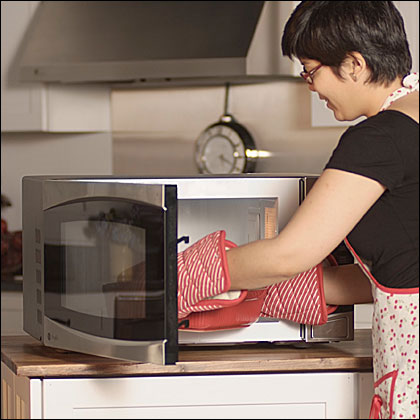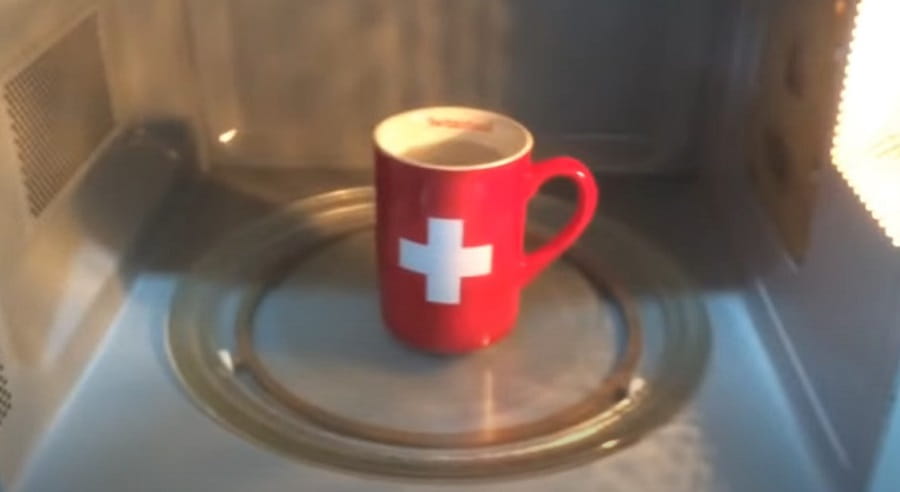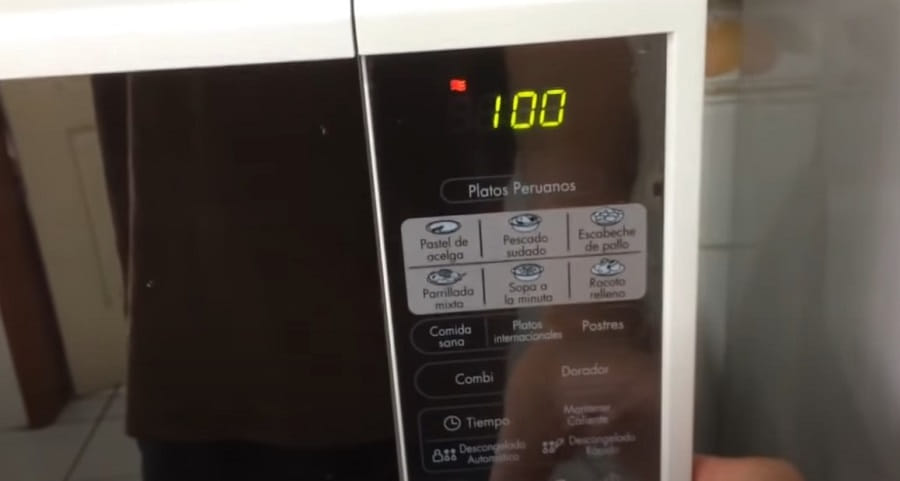How long to microwave water to boil? This is a question that consumers ask every day. This blog post will discuss the science behind microwaving water and how long it takes to boil. We’ll also provide tips for ensuring your water reaches a boil quickly. So, whether you’re trying to make a cup of tea or cook pasta, read on for all the information you need about microwaving water.

Can You Boil Water in A Microwave?
Yes, you can. Microwaving water is a great way to quickly and easily boil it for cooking or drinking. In general, the length of time you need to microwave your water will depend on the power of your microwave and the amount of water you’re microwaving.
To start, fill up a glass or heat-safe bowl with the desired amount of water. Place this in your microwave and set it to high power for about 1 – 3 minutes per cup of water. Use a plate or mug ring under the container to prevent your water from boiling.
The wattage of your microwave will determine how much time you need to boil a single cup of water. The usual rule of thumb for boiling a single cup of water in the microwave is:
- 1,200 watts: 1.5 minutes
- 1,000 watts: 2 minutes
- 800 watts: 2.5 minutes
- 700 watts: 3 minutes
- 600 watts: 4 minutes
Once your water reaches a boil, you’ll need to let it sit for an additional 30 seconds before removing it from the microwave. This will allow the water to cool slightly so that you don’t risk getting burned when pouring it out.
If you’re trying to cook or heat other foods in your microwave, consider using a glass bowl filled with water as a makeshift “cavity” for your food. This will ensure that your food heats evenly and quickly, without burning or overcooking.
Is It Okay to Heat Water in the Microwave?
Yes, it is. Microwaving water is safe and will not cause harmful chemicals to leach into your water. However, you should only microwave your water for the time needed to reach a boil.
If you continue to heat your water after it has reached a boil, you risk overcooking or burning it. This can cause your water to taste unpleasant or even release harmful compounds into the air.
Are There Any Safety Concerns With Microwaving Water?
Yes, there are some safety concerns that you should be aware of when microwaving water. First, you should never microwave your water in a sealed container. Doing so can cause your water to explode and potentially injure you.
Second, you should avoid microwaving boiling water, as it can cause your container to shatter or explode. Finally, it would help if you never microwaved a clogged drain or another utility pipe. This can lead to dangerous steam buildup and explosion risk.
Choose a Microwave-Safe Container. The first step to microwaving water is to choose a microwave-safe container. Any heat-safe bowl or mug will do, but we recommend using a glass, paper plate, Wax/parchment paper, or ceramic container.
You may like:
Properly microwaving water is a quick, easy, and safe way to get your desired results; whether heating a cup of tea or cooking dinner for the family, always follow the safety guidelines for microwaving water.
What Happens If You Microwave Water?
If you microwave water, the water molecules will start to vibrate. This causes friction, which produces heat. The water will continue to heat up until it reaches its boiling point. The water will turn into steam and begin to expand at this point.
If you have ever microwaved a cup of water and then forgotten about it, you may have noticed that the cup can become extremely hot. This is because the water has continued to heat up even after turning into steam.
To avoid this, let your microwaved water sit for 30 seconds before removing it from the microwave. This will dissipate steam and prevent your cup from becoming too hot to handle.
Why Should You Never Microwave Water?
There are several reasons why you should never microwave water. The first is that overheating the water can cause it to release dangerous chemicals into the air, which can harm your health.
Another reason not to microwave water is that it may cause your container to shatter or explode, potentially resulting in injuries. Additionally, you should avoid microwaving boiling water, which can lead to steam buildup and an increased risk of explosion.
If you need to boil water quickly for cooking or drinking purposes, microwaving is a safe and effective way to get the job done. However, it is essential to carefully follow safety guidelines and use common sense when microwaving water. By doing so, you can enjoy all of the benefits of this convenient cooking method without any risks.
Boiling Water in A Microwave: Danger Factor
The procedure for heating water in a microwave is complex. Because microwaving water has several hazards, such as burning from hot containers and/or boiling water and superheating, it demands special precautions.
- The microwave heats water to 212 degrees F, 100 degrees C, and the boiling point of water. The container and water become extremely hot as a result of this. You can be scorched or burned if you contact either of these substances. Blistering occurs due to burning, which must be controlled to prevent further difficulties. The majority of problems associated with microwaving water are caused by burning.
- Superheating: This is known as superheating, when water heats above the usual boiling point. The risk is that no bubbles are produced in the microwave, resulting in an explosion when it’s stirred. It can also explode if you remove the boiled water from the microwave before taking it outside.
Understanding the risks of boiling water in a microwave oven can assist you in preventing future problems.
What You Need to Know About Boiling Water in a Microwave

If you need to boil water quickly for cooking or drinking purposes, microwaving is a safe and effective way to get the job done. However, it is essential to carefully follow safety guidelines and use common sense when microwaving water. By doing so, you can enjoy all of the benefits of this convenient cooking method without any risks.
Here are a few tips to keep in mind when boiling water in a microwave:

- Use a microwave-safe container: Be sure to use a specifically designed container in a microwave oven. If you are unsure whether or not your container is microwave-safe, check the manufacturer’s instructions or do a quick online search.
- Add a small amount of water: When microwaving, add only a tiny amount. This will help prevent the water from becoming superheated and exploding.
- Use caution when removing hot water: When removing your microwaved water from the oven, use caution to avoid being burned by steam or hot liquid. Using oven mitts or a kitchen towel to protect your hands is best.
- Allow the steam to escape: If you are microwaving a covered container of water, let some steam escape before opening the lid. This will help prevent hot liquid from erupting out of the container.
- Check time: When microwaving water, it is essential to check the cooking time carefully. Many factors, such as the amount of water and type of container used, can affect how long the water will take to boil. By checking your microwave’s instructions or doing a quick online search, you can ensure that your water is heated safely and effectively.
- Confirm boiling point: Check the water’s temperature with a food thermometer before using it for cooking or drinking. This will help ensure that it has reached the boiling point and is safe to consume.
- Don’t wait too long to mix: To prevent superheated water, occasionally stir the water in the microwave. If the water boils without spilling, it is safe to utilize.
- Supervise your children: If you have young children in your home, it is crucial to supervise them using the microwave. Children should not be allowed to operate the microwave unsupervised. Boiling water in the microwave is a simple procedure that children of all ages can accomplish. It would help if you kept an eye on your kids while they do it. Because of the danger of exceeding and touching extremely hot microwave-safe containers, ensure they use the required gloves and are not too eager to remove warm things from the microwave.
- Never use any metallic, plastic, or Styrofoam utensil:l If you want to ensure that your water is free of impurities, only use glass or ceramic containers when boiling water in the microwave. Metallic, plastic, or Styrofoam utensils can release harmful chemicals into your water.
- Instead of a brand-new, smooth container, use an old, battered one with a few dents or chips. It eliminates any danger of the water boiling excessively and allows for constant bubble development (nucleation).
- By following these simple safety tips, you can enjoy all the benefits of boiling water in a microwave without any risks.
How Long To Microwave Water To Boil – FAQs
Q. How Can I Prevent My Water From Overheating Or Exploding When Microwaving?
A. To avoid overheating or explosions when boiling water in a microwave, it is essential to use a container specifically designed for use in a microwave oven. In addition, be sure to add only a tiny amount of water and check the cooking time carefully.
Q. What is the Best Way to Remove Hot Water From A Microwave?
A. When removing hot water from the microwave, it is best to use oven mitts or a kitchen towel to protect your hands. Additionally, allow some steam to escape before opening the lid.
Q. How Can I Ensure That My Microwaved Water Has Reached the Boiling Point?
A. The best way to ensure that your microwaved water has reached the boiling point is to check the water’s temperature with a food thermometer before using it for cooking or drinking.
Q. Why Is It Important to Occasionally Stir the Water in the Microwave?
A. Stirring the water occasionally helps prevent superheated water. Additionally, it is safe to utilize if the water boils without spilling.
Q. What Is the Best Way To Supervise Children when Using the Microwave?
A. If you have young children in your home, it is crucial to supervise them when they are using the microwave. Children should not be allowed to operate the microwave unsupervised. Also, ensure that they use oven mitts or a kitchen towel when removing hot water from the microwave and that they do not try to remove warm things from the microwave without supervision.
Q. Why does Water Not Boil in the Microwave?
A. Water does not boil in the microwave because there is no element to heat it from the bottom up on a stovetop. Also, microwaves create energy waves that cause water molecules to vibrate, producing heat. However, this process does not have enough heat to boil.
Q. What’s the Best Way to Make Water Boil Faster?
A. The best way to boil water faster is to use a kettle or a pot on the stove. Microwaves can also be used for boiling water. Still, using a container specifically designed for a microwave oven is essential, and carefully checking the cooking time. Additionally, adding a small salt to the water can help it boil faster.
Q. How Long does It Take for Water to Explode in the Microwave?

A. If water is heated in a microwave oven without any container, it will begin to expand and could eventually explode. However, this process takes several minutes, so there is no need to worry about an explosion if you use a container specifically designed for microwaving.
Conclusion
How Long To Put Water In Microwave To Boil? The microwave technique is a quick and safe approach to boiling water. However, you must follow precise instructions to minimize the danger of burning and superheating.
Stir frequently to distribute the heat as the water approaches boiling. When you microwave water, the molecules in the liquid are heated and move quickly, which causes it to superheat.
Following the steps and tips listed throughout the article, you can safely and efficiently boil water in the microwave. Whether you are using it for cooking or drinking, this approach allows you to enjoy your hot water without any risks associated with traditional boiling methods.
Read more Articles here and https://besttoolskitchen.com/
- How Long To Bake Salmon At 425 in Foil? - December 11, 2022
- How Long To Cook Chuck Roast In Oven At 350? - December 11, 2022
- How Many Chicken Wings Are In A Pound? - November 26, 2022
